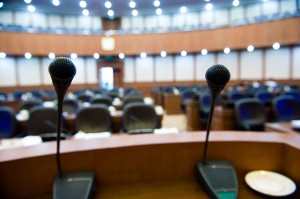A Place at the Podium

In May of last year I attended a rally with my union, the United Federation of Teachers, which is a federation of teachers, nurses, and other professionals working in New York City’s five boroughs. We were joined by other city unions in an effort to bring attention to the need for a higher minimum wage. My thirty-plus years as a New York City teacher meant that I often attended these rallies in the city. There was something very different about this one.
This rally began with an invocation. A rabbi, a minister, and an imam were all on the stage. There, at the podium, each said a few words of thanks to God for his help in this situation. I was appalled! I had never seen a city rally start with prayer. It made me very uncomfortable.
Two colleagues who had accompanied me to the rally were equally appalled, and each had Jewish or Christian affiliations. Another colleague was a Buddhist. With their encouragement, I approached our union president after the invocations. I said, “Michael why was that included? This is a city rally; a secular situation.” He looked uncomfortable and replied, “Sharon that is not our struggle. It’s not why we’re here today.”
The situation left me very uneasy and disheartened. Being called down for one reason (the rally) only to be forced to participate for another. Most disturbing was witnessing yet another example of the separation between church and state being whittled away, little by little, here and there.
Thankfully I’m not the only one who feels this way. I’m also glad to know that humanists are responding to these situations in a proactive, positive way.
In early May of this year, in response to the U.S. Supreme Court ruling in Town of Greece V. Galloway, the American Humanist Association (AHA) asked people to volunteer as “ secular invocators.” I immediately stepped up to the challenge. In an effort to promote humanism and to give it a familiar identity, the AHA was asking for volunteers to join clergy at times when invocations were being requested. In other words, not only would the three Abrahamic religions be represented, a humanist invocator would also be present.
As time goes on, seeing humanists more often in the public sector will add familiarity to our presence. In this way, belief and disbelief will be equally represented. No special training is needed and the Humanist Society (an adjunct of the AHA) provides examples of secular invocations and other resources. They will also maintain a database of people from all over the country who could be available for this service. I am delighted to be included in this important capacity.
So the next time the UFT holds a rally, I’ll be there to support their secular goals. And if the organizers decide to open with prayers, I’ll do my part to inject some humanism into the mix.
